Politics
NRM Issues Detailed Guidelines For 2026 Election Aspirants
Published
5 months agoon
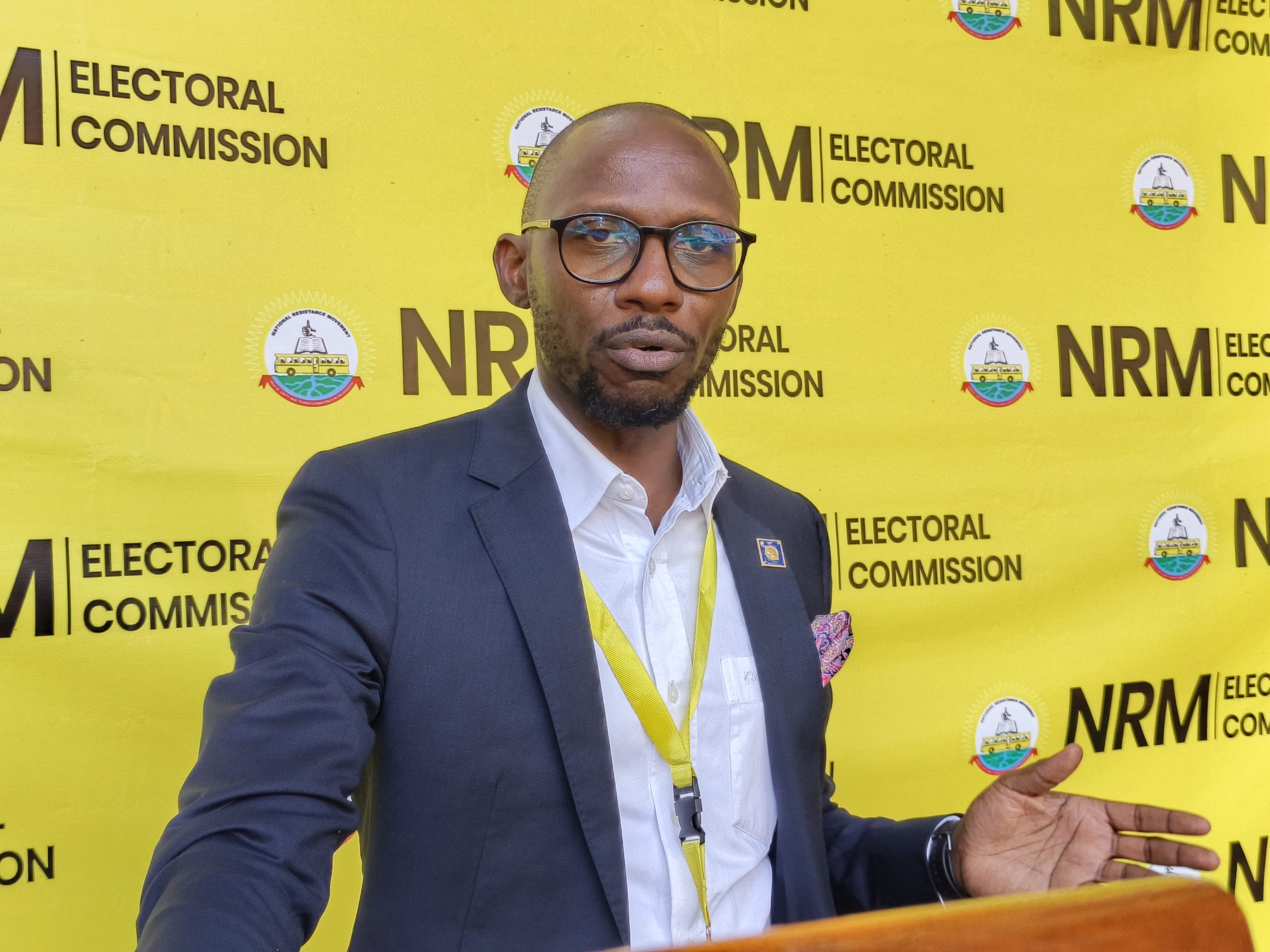
The ruling National Resistance Movement (NRM) has issued a sweeping and strict guidelines governing the nomination, conduct, and eligibility of candidates ahead of its internal primary elections and the 2026 national elections.
The directive, issued by the party’s Director of Legal Services, Enoch Barata, outlines mandatory legal, academic, and ethical standards that all aspirants must meet to secure nomination under the NRM ticket. The 9-page document also elaborates on strict conditions related to resignation from public service, criminal conduct, and electoral behaviour.
The guidelines come when the Nomination exercise is set to start on June 17th to end June 30th 2025 as the party elections for Parliamentary seats , Mayoral and LC5 District Chairpersons are for July 16th 2025.
According to Barata, the nomination of candidates is not merely an administrative step, but a constitutional responsibility that must comply fully with national electoral laws and internal party rules. Every candidate, regardless of their status or political standing, must undergo verification and clearance by the Directorate of Legal Services prior to nomination. At the heart of the eligibility requirements is proof of identity and citizenship. Every aspirant is expected to present their National Identity Card or a verifiable application form from the National Identification and Registration Authority (NIRA) to establish Ugandan citizenship. In addition, candidates must demonstrate that they are duly registered voters with the National Electoral Commission. This is done by attaching a voter location slip that confirms the aspirant’s presence on the National Voters’ Register. Similarly, aspirants must be registered in the NRM’s own voters’ register, affirming their status as members eligible to participate in internal party structures and primaries.
On the academic front, the guidelines set a clear threshold particularly for those aspiring to the positions of Member of Parliament or Local Government Council V (LC V) Chairperson. Barata noted that the minimum academic requirement for such positions is the Uganda Advanced Certificate of Education (UACE), with an accompanying letter of verification from the Uganda National Examinations Board (UNEB). For candidates who did not pursue A’ Level education but followed alternative educational paths, the law permits the submission of a certificate of equivalence issued by the National Council for Higher Education (NCHE). Additionally, holders of diplomas or university degrees—obtained from recognized institutions in Uganda or the former University of East Africa—must provide certified academic documents to that effect. These qualifications are enforced in line with Section 4 of the Parliamentary Elections Act, Cap. 177.
The issue of name consistency is also addressed in the new directives. Aspirants whose names differ from those appearing in their academic or identification documents must provide evidence explaining the change. For minor corrections, a statutory declaration registered with the Uganda Registration Services Bureau (URSB) will suffice. However, where the change is substantial, proof of a published notice in the Uganda Gazette is mandatory, accompanied by evidence of compliance with Section 36 of the Registration of Persons Act, 2015.

The Director NRM Legal Services Enoch Barata
In one of the most consequential parts of the directive, the NRM mantains that June 14, 2025, as the mandatory deadline for all public officers intending to seek political office to resign from their positions. This applies to civil servants, employees of statutory bodies, members of the Uganda People’s Defence Forces (UPDF), the Uganda Police Force, and any other category of public servants. For parliamentary aspirants, this requirement is backed by Section 4(4) of the Parliamentary Elections Act, which stipulates that any public officer must resign at least ninety days before nomination day in the case of a general election. In the case of a by-election, Lawyer Barata states that resignation must occur at least fourteen days before nomination. For local government aspirants, the legal provision is derived from Section 116(5) of the Local Government Act, which mandates resignation at least thirty days before nominations. Barata emphasized that candidates must present formal evidence of resignation in accordance with the terms and procedures specific to their employing institutions, as interpreted by the Courts of Judicature.
Equally robust are the provisions disqualifying individuals with certain criminal records or financial incapacities from running for office. Any person currently serving a sentence of death or imprisonment exceeding nine months without the option of a fine is barred from contesting under the NRM. Similarly, individuals who have been convicted within the past seven years of crimes involving dishonesty, moral turpitude, or violations of electoral laws are ineligible as per the guidelines.
Moral turpitude, as clarified in the directive, refers to acts of shameful wickedness that are contrary to justice, honesty, or good morals, a definition that Barata has drawn from a certain judicial precedent of 1967.
In addition, persons who have been adjudged bankrupt and not discharged are prohibited from standing for office. A special emphasis is placed on individuals convicted under Sections 2 through 25 of the Anti-Corruption Act of 2009. Such individuals are automatically disqualified from holding public office for ten years from the date of conviction.
In addressing the conduct expected during campaigns, the NRM has instituted one of its most comprehensive codes of political behavior to date. Candidates are strictly prohibited from engaging in bribery, whether through direct gifts, money, or any other forms of inducement. This includes handing out items such as food, clothes, or any form of consideration that might be construed as influencing voter behavior. Alcohol and intoxicants are equally banned from campaign activities. Furthermore, no candidate or their agents are allowed to solicit gifts or conduct any form of fundraising during the campaign period.
The Legal Director Barata has clarified that any such acts could be interpreted as electoral offences with potentially disqualifying consequences.
The directives also prohibit defamatory or inflammatory language, incitement to public disorder, and any speech that could stir sectarianism or hatred. Candidates must refrain from making reckless statements about their opponents, including false allegations about illness, death, or withdrawal. The use of songs, poems, or images intended to ridicule, insult, or demean another candidate is expressly banned. The use of tribal, religious, or sectarian symbols or colors in campaign material is also forbidden.
On polling day, the guidelines impose a number of restrictions intended to preserve peace and order. Candidates and their supporters are barred from assembling in groups of more than twelve people. There must be no public singing, dancing, band performances, or distribution of campaign materials. The consumption or sale of alcohol is strictly prohibited. Any form of vote canvassing, slogan shouting, or attempts to influence voters at polling stations will be treated as an electoral offence.
Despite the strict limitations, the directive allows for structured and lawful campaign activities. Candidates may use various media platforms to promote the NRM’s manifesto and political agenda. They are expected to follow the Independent Electoral Commission’s campaign program and promote peaceful and orderly campaigns that tolerate opposing views. Barata reminded all aspirants that refreshments may be offered during internal candidate planning meetings, provided these are not used as campaign bribes.
The party’s electoral roadmap provides that nomination forms and expression of interest for the internal party elections for both Members of Parliament and LC V positions shall be available from June 2 to June 15, 2025. This means any public servant intending to contest must have their resignation formalized and documented by June 14, 2025, at the latest.
Speaking about the wider objective of these guidelines, Enoch Barata emphasized that the measures are intended to promote discipline, transparency, and credibility in the party’s internal processes. He noted that the new guidelines are not only a compliance tool with national law but also a reflection of the party’s commitment to political maturity and ethical governance.
Uganda Radio Network has also seen a letter addressed to the Government Chief Whip Hamson Obua asking him to disseminate and circulate the guidelines to the legislators such that it can become a good reference to the candidates going for nomination next week.
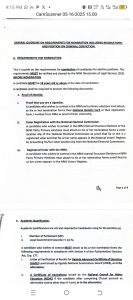
The Guidelines for the Aspirants to follow.
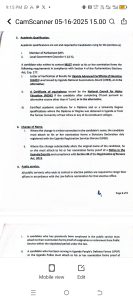
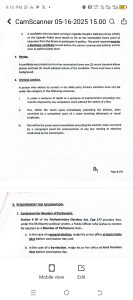
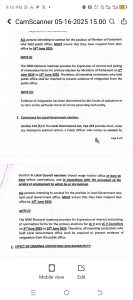
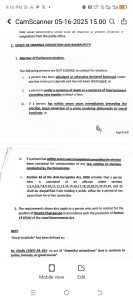
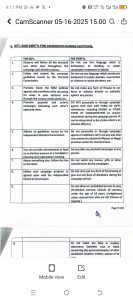
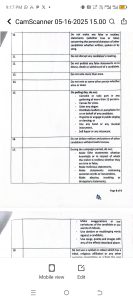
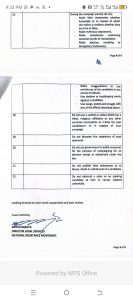
You may like
-


Police Officers’ Qualifications Confirmed in Commissioner Mugume Dispute
-


NRM Tribunal Orders EC to Declare Ruhaama County Results in Two Days
-


Is Jailed Police Human Resource Commissioner Mugume a Victim of a Hit Job?
-
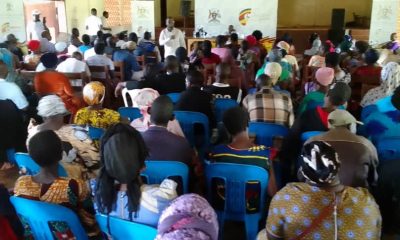

Security Agencies , Hongera Saana Uganda/Office of the President Offer Free Trackers to Boda-Boda Riders
-
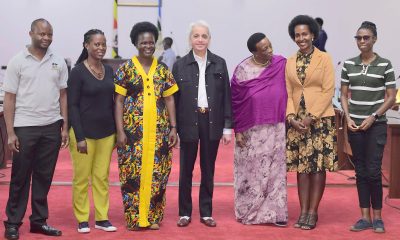

Patriotism Commissioner Hellen Seku Taps into Benny Hinn’s Blessings at State House
-


Dr Charles Ngabirano Nominated for Rwampara East MP Seat, Vows to Complete Key Projects


